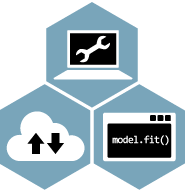If I had to state one area of primary focus for my consulting work, it would be analytics. Effective data analytics can transform your organization, helping it to function more smoothly and reach a new level of profitability.
In my lifetime analytics has completely transformed the way companies do business. When I started in tech in 2000, only the most sophisticated companies were doing what is considered analytics data, using visualization and reporting tools to gain nearly real-time insights into data. But now, with the profusion of analytics tools in the last decade, companies of nearly any size can gain tremendous insight into their company’s data, insight which, when acted upon properly, can give them a significant advantage against their competitors.
Given two relatively similar companies where all else is equal, but one of them has an effective analytics culture and one of them doesn’t, you can be nearly certain that the more data-driven organization will be more successful. Effective use of data is perhaps the most important distinguishing factor in today’s business world. There’s a lot of hype around data, but the core truth that data is probably your organization’s most valuable asset is not a fad. It has been proven time and time again that data-driven decision making produces better business outcomes.
But even companies with established data operations and teams often struggle to manage and leverage the ever-increasing amount of data flowing through them. The most successful companies don’t simply hire good people and put good tools in place - they have a culture, throughout the organization from bottom to top, of understandind the immense value of data as an asset and making every key decision based on high-quality, up-to-date, easily accessible data.
And that focus on culture is why I don’t call myself an analytics consultant, because I believe that would state my purpose too narrowly. As a data scientist, I realized that a lot of companies who hired data scientists really needed expertise in data engineering. And as a data engineer I realized that the typical role boundaries often prevent any one person in the organization from seeing the bigger data picture. Building effective data pipelines and operationalizing machine learning models goes well beyond the usual understanding of ‘analytics’.
My journey as a data professional has been a long and exciting one, and in many way’s it’s still just getting started. Having filled many data-related roles through the years, I’m excited to escape the confines of any of those individual roles and help companies to build holistic data cultures. The process of building such a culture is always challenging, and comes with many frustrations along the way. But when you see a well-oiled data machine in action, and see a company that takes itself to the next level by embracing an organization-wide data vision, you see that all of the frustrations were worth it, and the results speak for themselves.
 Northwest Data Consulting
Northwest Data Consulting